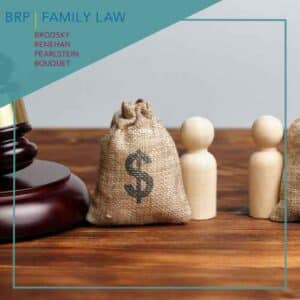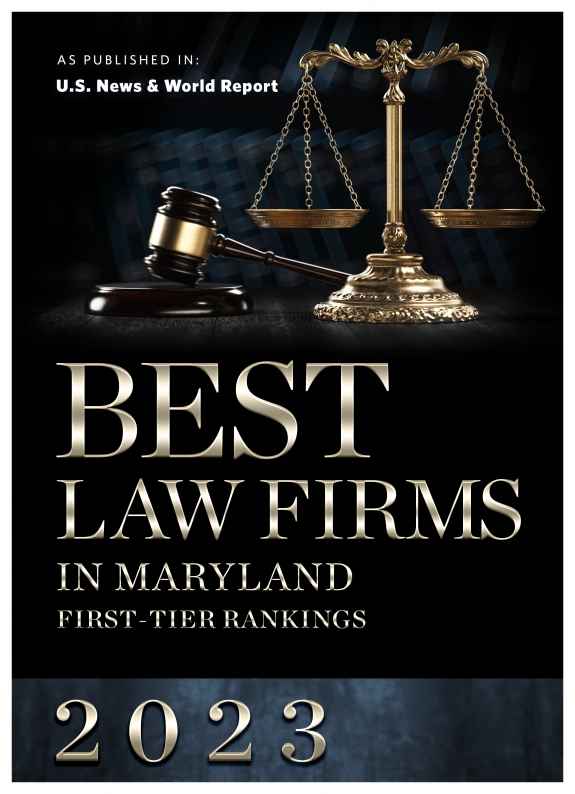
Divorce is not just the end of a marital relationship. It is also the beginning of a complex process of untangling the financial and physical assets accumulated during the union. Understanding the asset division process can significantly impact both parties’ financial futures in Maryland.
That is why having a Maryland family law attorney by your side is crucial. Our team at Brodsky Renehan Pearlstein & Bouquet is here to explain the asset division process in Maryland and provide you with the foundational knowledge to navigate this challenging aspect of divorce.
Equitable Distribution in Maryland
Maryland adheres to the principle of equitable distribution in the division of marital property during a divorce. It is crucial to understand that “equitable” does not automatically imply “equal.” Instead, the court aims to achieve a fair distribution based on several factors, including, but not limited to, the length of the marriage, causes that led to the estrangement of the parties, each spouse’s contributions, and how and when property was acquired. This system recognizes that monetary and non-monetary contributions to the marriage are valuable and should be considered when dividing assets.
What Qualifies as Marital Property?
Identifying marital property is an important first step in the asset division process during a divorce. Marital property generally includes almost all assets accrued by either spouse throughout the duration of the marriage, irrespective of whose name is on the title. This broad category can include:
Real Estate
Real estate includes the family home and any additional properties bought during the marriage. Whether it is a vacation home, rental property, or even land, if acquired while married, it’s typically considered marital property. The value assessed on these properties for division purposes includes the current market value and any depreciation or appreciation that occurred during the marriage.
Vehicles
Vehicles are a significant part of marital assets, covering cars, trucks, motorcycles, boats, and even bicycles purchased during the marriage. Even if a vehicle is registered in only one spouse’s name, it is generally included in the marital estate if purchased after the wedding. The equitable division will consider usage, need, and value depreciation factors.
Retirement Accounts
Retirement accounts, including 401(k)s, IRAs, and pension plans accrued during the marriage, are considered part of the marital estate. Dividing these accounts can be complex, requiring specific legal documents like a Qualified Domestic Relations Order (QDRO) to ensure that disbursements are made correctly without incurring penalties or unintended tax consequences.
Business Interests
Business interests represent one of the more complex components of marital property. If a business was started or acquired during a marriage, it could be considered marital property. This includes not just the current value of the business but also its growth potential and the contributions made by either spouse towards its development. Valuing and dividing a business in a divorce requires a detailed analysis, often necessitating financial experts to assess its worth accurately.
It is critical to note that there are notable exceptions to this general rule. Inheritances or gifts specifically given to one spouse and property acquired before the marriage are typically excluded, provided they were kept separate from marital assets and not commingled with joint property. Additionally, items purchased with non-marital funds or as part of a prenuptial agreement may be exempt.
The delineation between marital and non-marital property can often become blurred, especially with long marriages where assets and personal finances become deeply intertwined. For instance, an inheritance received by one spouse but used towards the family home can possibly transform into a marital asset. Similarly, a business owned before the marriage but grown substantially through marital efforts or investments could partially qualify as marital property.
Given how complex it can be to divide marital property and the significant impact that asset categorization can have on the equitable distribution process, the guidance of a knowledgeable divorce lawyer in Maryland is invaluable. An attorney can offer crucial advice, ensure assets are categorized correctly, and advocate for a fair division that reflects the contributions and rights of both parties. Their guidance can be the key to navigating the intricacies of asset division with confidence and clarity, securing a financial outcome that facilitates a positive step forward post-divorce.
The Division Process
Once marital property is identified, its value must be assessed before it can be divided equitably. This often requires appraisals and might involve complex valuations, especially for items like businesses, stock options, or unique collectibles..
The actual division of assets can take various forms by agreement; however, the court can only order joint assets sold and the proceeds divided equally subject to a monetary award. Couples may agree to sell certain assets and split the proceeds, or one spouse may “buy out” the other’s interest in a shared asset. In some cases, assets are divided directly, with each party receiving portions of various assets. The method chosen depends on the couple’s circumstances and preferences, but always with an eye toward achieving an equitable outcome.
The Role of Prenuptial Agreements
Prenuptial agreements can significantly impact the asset division process by predetermining how certain assets will be treated in the event of a divorce. These agreements are particularly relevant for protecting pre-marital assets or inheritance rights. However, for a prenuptial agreement to influence divorce proceedings, it must be deemed valid and enforceable under Maryland law. A divorce lawyer in Maryland can advise on creating and enforcing such agreements.
Seeking Legal Help
The intricacies of asset division in Maryland underscore the importance of engaging a competent Maryland family law attorney. An experienced lawyer can provide invaluable assistance throughout the divorce process, from identifying and valuing marital property to negotiating a fair distribution of assets. Additionally, an attorney can represent your interests in court if a satisfactory agreement cannot be reached through negotiation.
Given the significant impact that asset division can have on your financial well-being post-divorce, choosing the right legal partner is paramount. Our attorneys at Brodsky Renehan Pearlstein & Bouquet deeply understand Maryland’s equitable distribution laws and have a proven track record of advocating effectively for our clients’ interests.
Contact Our Maryland Family Law Attorney Today
At Brodsky Renehan Pearlstein & Bouquet, we know that the decisions made during your divorce will have lasting impacts on your life. That’s why we’re dedicated to offering exceptional legal counsel and the personalized attention and respect you deserve.
If you are facing the prospect of dividing assets in a Maryland divorce, do not go it alone. Contact our divorce lawyer in Maryland today to secure a legal team combining experience, strategy, and a compassionate approach to protect your financial future. With us by your side, you can move forward confidently, knowing you have a partner committed to securing the best possible outcome for your case.






